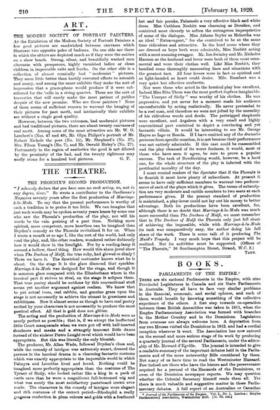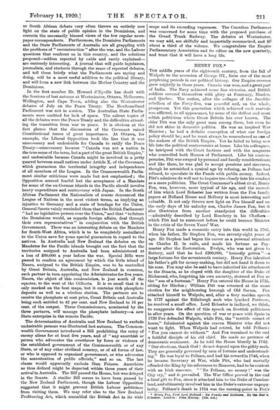BOOKS.
PARLIAMENTS OF THE EMPIRE.* THERE are six national Parliaments in the Empire, with nine Provincial Legislatures in Canada and six State Parliaments in Australia. They all have to face very similar problems in the financial, economic, and social spheres, and each of them would benefit by knowing something of the collective experience of the others. A first step towards co-operation between these British Assemblies was taken in 1911, when the Empire Parliamentary Assooiation was formed with branches in the Mother Country and in the Dominions. Legislators from overseas are always welcome here. A deputation from our two Houses visited the Dominions in 1918, and had a cordial reception wherever it went. The Association has now entered on the second and more serious stage of its work by producing a quarterly journal of the several Parliaments, under the editor- ship of Mr. Howard d'Egville. The journal is intended to give a readable summary of the important debates held in the Parlia- ments and of the more noteworthy Bills considered by them. Not many of us have time to read the Westminster Hansard. Few indeed are there who have the leisure and the perseverance required for a perusal of the Hansards of the Dominions, or even of the Dominion newspaper reports. We may question whether the Colonial Secretary himself reads them all. Yet there is much valuable and suggestive matter in these Parlia- mentary debates. A full report of an Australian or Canadian • Journal of the Posifwsents of the Empire. Vol. I No. 1. London : Empire Parliamentary Amalgam. Westminster Hall. [7e. 641. net.I
or South African debate very often throws an entirely new light on the state of publio opinion in the Dominions, and corrects the necessarily biassed views of the few regular news- paper correspondents. Furthermore, the Dominion Parliaments and the State Parliaments of Australia are all grappling with the problems of " reconstruction " after the war, and the Labour questions that confront us in this country, and the solutions proposed—seldom reported by cable and rarely explained— are curiously interesting. A journal that will guide legislators, journalists, and students through the maze of reported debates, and tell them briefly what the Parliaments are saying and doing, will be a most useful addition to the political library, and will form a new link between the Mother Country and the Dominions.
In the first number Mr. Howard d'Egville has dealt with the Sessions of last autumn at Westminster, Ottawa, Melbourne, Wellington, and Cape Town, adding also the Westminster debates of July on the Peace Treaty. The Newfoundland Parliament was not in session. The Australian State Parlia- ments were omitted for lack of space. The salient topics of all the debates were the Peace Treaty and the difficulties attend- ing the transition from war to peace. It is obvious at the first glance that the discussions of the Covenant raised Constitutional issues of great importance. At Ottawa, for example, the Liberal Opposition took the line that it was unnecessary and undesirable for Canada to ratify the Peace Treaty—unnecessary because " Canada was not a nation in the true sense of the term, but a part of the great British Empire," and undesirable because Canada might be involved in a petty quarrel between small nations under Article X. of the Covenant, which guarantees the territorial integrity and independence of all members of the League. In the Commonwealth Parlia- ment similar criticisms were made but not emphasized ; the Opposition seemed fearful lest the acceptance of a Mandate for some of the ex-German islands in the Pacific should involve heavy expenditure and controversy with Japan. In the South African Parliament the Nationalists of course denounced the League of Nations in the most violent terms, as implying an injustice to Germany and a state of bondage for the Union. General Smuts vainly reminded them that the British Parliament " had no legislative powers over the Union," and that "in future the Dominions would, as regards foreign affairs, deal through their own representatives " in conjunction with the British Government. There was an interesting debate on the Mandate for South-West Africa, which is to be completely assimilated to the Union save for some special guarantees in regard to the natives. In Australia sand New Zealand the debates on the Mandates for the Pacific islands brought out the fact that the territories assigned to Australia had been administered at a loss of £60,000 a year before the war. Special Bills were passed to confirm an agreement by which the little island of Nauru, assigned to the British Empire, was to be controlled by Great Britain, Australia, and New Zealand in common, each partner in turn appointing the Administrator for five years. Nauru, the object of this condominium, is just south of the equator, to the west of the Gilberts. It is so small that it is only marked on the best maps, but it contains rich phosphate deposits as well as a wireless station. The partners are to receive the phosphate at coat price, Great Britain and Australia being each entitled to 42 per cent. and New Zealand to 16 per cent. of the output. Three Commissioners, nominated by the three partners, will manage the phosphate industry—a new State enterprise in the remote Pacific.
The determination of Australia and New Zealand to exclude undesirable persons was illustrated last autumn. The Common- wealth Government introduced a Bill prohibiting the entry of enemy aliens for at least five years, and of " any anarchist or person who advocates the overthrow by force or violence of the established government of the Commonwealth or of any State, or of any other civilized country, or of all forms of law, or who is opposed to organized government, or who advocates the assassination of public officials," and so on. The last clause would apparently exclude Sinn Feiners. Anarchists as thus defined might be deported within three years of their arrival in Australia. The Bill passed the House, but was delayed in the Senate. A similar Bill seems to have been passed by the New Zealand Parliament, though the Labour Opposition suggested that it might prevent British Labour politicians from visiting them. We may refer also to the New Zealand Profiteering Act, which resembled the British Act in its wide scope and its exceeding vagueness. The Canadian Parliament was concerned for some time with the proposed purchase of the Grand Trunk Railway. The debates at Westminster, we may add, are skilfully and impartially summarized, and fill about a third of the volume. We congratulate the Empire Parliamentary Association and its editor on the new quarterly, and trust that it will have a long life.



































 Previous page
Previous page